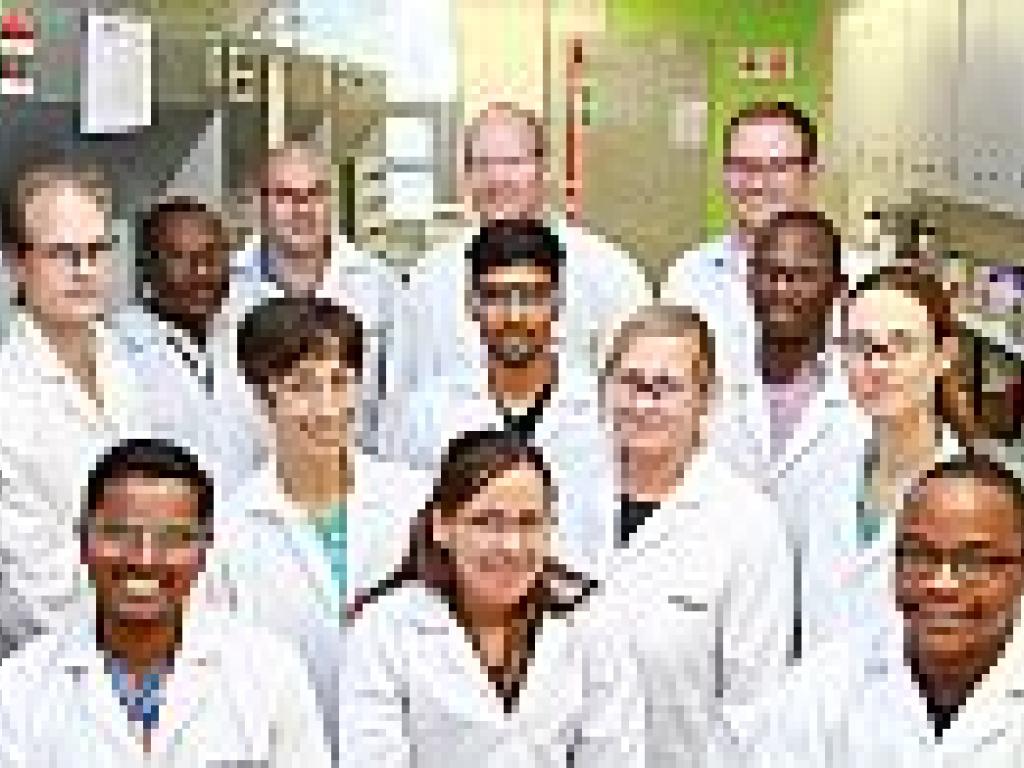H3D Identifies a Second Potent Anti-Malarial Candidate

The University of Cape Town (UCT)’s Drug Discovery and Development Centre, H3D, has identified a new potent anti-malarial development candidate with potential for both treatment and prevention of malaria.
The compound, referred to as UCT943, is the second preclinical candidate to come out of the collaboration led by H3D involving the Switzerland-based Medicines for Malaria Venture (MMV) and an international network of partners.
Developed to strengthen the parasite enzyme phosphoinositide 4-kinase inhibitor programme, UCT943 has the same molecular target as MMV048, a promising new compound researched by an international team led by H3D and selected for development in 2012. The data so far shows that UCT943 has promise to be more potent against the parasite, and to be easier to formulate, although these aspects will be the subject of the next studies, and ultimately will need to be validated in humans.
“Like MMV048, UCT943 has potent activity against all stages of the malaria parasite life-cycle and has the potential to block transmission of the parasite from person to person and, as such, could contribute to the eradication of malaria, a disease that claims the lives of around half a million people every year,” said Professor Kelly Chibale, Founder and Director of H3D.
“The pre-clinical assessment of UCT943 is expected to take around 18 months, after which the hope is that it will progress into safety studies in human volunteers,” said Professor Chibale, who is also the founding Director of the South African Medical Research Council Drug Discovery and Development Research Unit at UCT and South Africa Research Chair in Drug Discovery under the South Africa Research Chairs Initiative (SARChI) of the South African government’s Department of Science and Technology (DST).
“Given the threat of drug-resistant strains of malaria it’s important to have a strong pipeline of new types of molecules,” said Dr Timothy Wells, MMV’s Chief Scientific Officer. “Kelly Chibale and his international team of experts have made huge progress over the last four years. We look forward with great enthusiasm to following the progress of UCT943: It has great potential not just for treating malaria but also providing protection against infection.”
The Minister of Science and Technology, Naledi Pandor, said: “The Department of Science and Technology is proud to be associated with the research done by Professor Chibale and H3D, and will continue to support their remarkable work. Their research is proving to be a valuable resource for the country and a vital asset in the training of the African scientists who will lead our continent’s research and development in years to come.”
H3D is Africa’s first integrated drug discovery and development centre. When H3D was first launched in 2010, it was a team of five academic postdoctoral research scientists. Now, H3D has grown to a team of over fifty, attracting industry-experienced drug discoverers from pharmaceutical companies based in India, the USA and Europe. It is also helping to train a new generation of African scientists, creating strong foundations for the future. This transformation has also allowed the transfer of key skills and technology to South Africa: from medicinal chemistry to biology and pharmacokinetics. The H3D portfolio also includes projects targeting tuberculosis drug discovery and is now expanding to address the serious threat of Antimicrobial Resistance, specifically resistant Gram negative bacteria.
“We are creating an industry that wasn’t in South Africa before, discovering exciting new molecules that are being developed into medicines. This industry we are creating is contributing to the DST’s bio-economic strategy. It will also increase our ability to create science jobs and use science for the development and benefit of our people. We’ve managed to attract millions of dollars of Foreign Direct Investment and create career opportunities for graduates,” said Professor Chibale.
UCT Vice-Chancellor, Dr Max Price, said: “Delivering two preclinical candidates within five years is an outstanding record by international standards especially for a drug discovery centre based at an academic institution. The value of a second candidate signals that the first compound was not a once-off, but part of a sustained and systematic programme.”
This project has benefited from sustained funding from MMV, the Technology Innovation Agency (TIA) and Strategic Health Innovation Partnerships (SHIP) unit of the South African Medical Research Council. This has been critical in helping H3D reinforce scientific networks of drug discoverers, particularly understanding the role of UCT943 to block the transmission of the parasite. This aspect of H3D’s work has benefitted from the South African Transmission Blocking Consortium (SATBC), which involves researchers from the University of Pretoria, Council for Scientific and Industrial Research, University of the Witwatersrand and National Health Laboratory Services and is funded by SHIP. SHIP is an initiative of the DST whereas TIA is an agency of the DST.
“This is an affirmation that TIA’s strategic investments in health technology development for socio-economic impact are steadily bearing fruit,” said the CEO of TIA, Mr Barlow Manilal. “The outcomes of this investment will contribute to strengthening pathways for the commercialisation of innovator drugs in South Africa.”
Issued by H3D at the University of Cape Town and the Department of Science and Technology, South Africa.
Enquiries
H3D, University of Cape Town
Kim Cloete
082 415 0736
Department of Science and Technology
Taslima Viljoen
082 990 1685
ABOUT MALARIA
Malaria can kill within 24 hours of symptom onset.
There were 214 million new cases of malaria worldwide in 2015, with 88% of these cases occurring in Africa. In 2015, there were an estimated 438,000 malaria deaths worldwide, with 90% of these deaths in Africa. Children under five years old are particularly susceptible to malaria illness, infection and death. In 2015, malaria killed an estimated 306 000 under-fives globally, including 292 000 children in the African region.
(Key estimates from World Malaria Report 2015).
